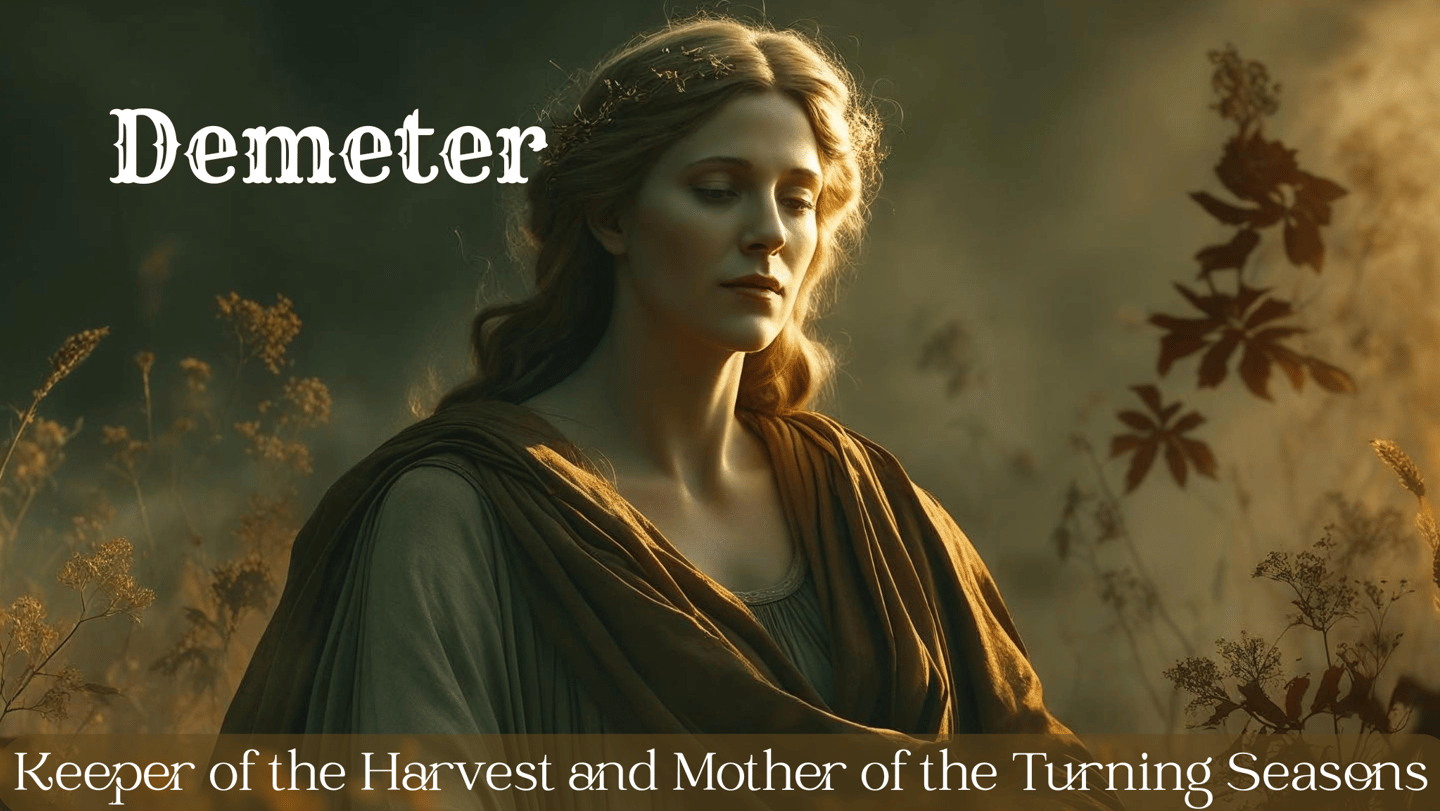Who Is Demeter?
When the wheat fields sway in the golden breath of late summer, when the orchards bend heavy with fruit, and when the earth feels generous with its bounty—you can be certain Demeter walks among us.
She is the Greek goddess of the harvest, the divine nurturer of grain, fertility, and the sacred cycles of life. Her blessings fill the barns, swell the grapes on the vine, and lay bread upon the tables of humankind. Yet, like the seasons she governs, her story holds both abundance and loss, joy and sorrow.


Demeter’s name means “Earth Mother,” and indeed, she is the embodiment of the nurturing, fertile land. Revered across the ancient world, she presided over agriculture and the growth of crops, particularly wheat and barley—life’s sustaining food.
She is also guardian of sacred law and the Eleusinian Mysteries, ancient rites promising initiates insight into the cycle of death and rebirth. In her, we see the earth’s generosity and its ability to withdraw, a balance between giving and resting.
Symbols and Sacred Offerings
Golden Wheat & Barley – Gifts of sustenance
Cornucopia – The horn of plenty
Poppies & Mint – Plants sacred to her mysteries
Bread & Honey Cakes – Offerings of gratitude
Colors: Gold, green, deep red, and earthen brown
The Legend of Demeter and Persephone: The Seasons’ Song

Long ago, the earth was in endless bloom under Demeter’s loving care. Fields stretched green and full, fruits ripened early, and no one knew hunger. But Demeter’s heart belonged most to her daughter, Persephone, whose laughter was brighter than summer.
One day, as Persephone gathered flowers in a meadow, the ground split apart, and Hades, Lord of the Underworld, emerged in a chariot of obsidian. He swept her away into the shadowed realm below.
When Demeter discovered her daughter missing, her grief shook the earth. She wandered far and wide, torch in hand, refusing food, drink, or rest. Crops withered. Famine spread. Even the gods began to suffer.
At last, Zeus intervened, sending Hermes to bring Persephone back. But because the maiden had eaten six pomegranate seeds in the Underworld, she was bound to return there for six months each year.
And so the world changed.
When Persephone is with Demeter, the earth blooms—spring and summer arrive in joy and abundance. When Persephone descends, Demeter mourns, and autumn’s golden fields fade into winter’s rest.
Thus, the cycle of the seasons was born.

Working with Demeter in Your Practice
Demeter is a powerful goddess for rituals of fertility, abundance, motherhood, seasonal magick, and protection of the harvest.
Ways to Honor Her:
Bake bread or honey cakes and offer them on your altar
Keep a small jar of wheat or grain as a talisman of abundance
Plant seeds with intention, speaking blessings over them
Observe the seasonal equinoxes as sacred turning points
Leave offerings at the edge of a field or garden in gratitude for the land’s gifts
A Whisper from Demeter
“The earth and the heart share the same rhythm.
We plant, we tend, we reap… and then we rest.
Do not fear the winter within—
for spring will always come again.”
Final Thoughts
Demeter is more than a harvest goddess—she is the cycle of life embodied, the eternal reminder that love, even when tested by loss, will always bloom again. To walk with her is to honor both the fertile fields and the quiet winters that renew them.


